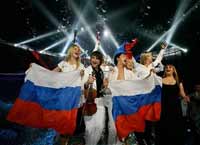Eurovision becomes competition of worthless music and priceless politics
For the first time in history, Russia took the first place at the Eurovision Song Contest. This contest may not be very popular with many people, especially in the USA, although it has become the most important event in the world of Russia’s pop music. Many would say that this contest is held only among shallow and cheap pop singers, who never can make it big. They would be absolutely right. However, Eurovision gave Russia its first landmark international victory in pop music.

Dima Bilan, a Russian pop singer, who previously represented Russia at Eurovision in 2006, won the top honors of the contest on May 25. The number of Dima Bilan’s fans in Russia and maybe several European countries has increased dramatically after his victory.
May of 2008 will certainly enter the Russian history as the period of great luck. Russia’s Zenit football team from St. Petersburg took the UEFA Cup, whereas the Russian hockey team became the world champion. These victories were followed by the triumph at Eurovision, the contest of music big talk, political and democratic games.
One should cool down after euphoria from the victory and think what stands behind this title apart from the Crystal Microphone prize and an opportunity for Moscow to host the next Eurovision Song Contest.
It is an open secret that Eurovision has virtually developed into a political struggle. Music and songs have lost their importance in the contest and gave way to politics. The countries participating in the contest use Eurovision to prove and exercise their superiority.
The Baltic States needed to confirm their new European status: Latvia and Estonia won the contest. Ukraine wanted to prove that it no longer considered itself a Russia-dependent state, so it won Eurovision too.
Last year’s victory of Serbia became a sign of European integration. To say nothing of Greece and Turkey that try to enter the European Union with different success.
Russia has not won Eurovision under Putin, who was considered to be an authoritarian leader in the West. Now things have changed. Russia received a new liberal and civil president Dmitry Medvedev.
Nevertheless, Dima Bilan’s triumph is unlikely to have a political implication. Statistically the countries of the former Eastern bloc have been leading in the latest contests of Eurovision. No country of Old Europe can compete with the friendly union of the countries of the former USSR or Yugoslavia. There is also the Scandinavian-Arab bloc. The Eurovision Song Contest is no longer a music contest between countries; it is a political competition between blocs. They choose the best leader in every bloc and give him or her the largest number of votes.
However, Dima Bilan and his team do not want to think why they have won. In any case a song performed Olympic champion Evgeni Plushenko and virtuoso Edwin Marton with Stradivari violin was sure to be successful, with or without Bilan.
Translated by Julia Bulygina
Pravda.ru
Subscribe to Pravda.Ru Telegram channel, Facebook, RSS!




